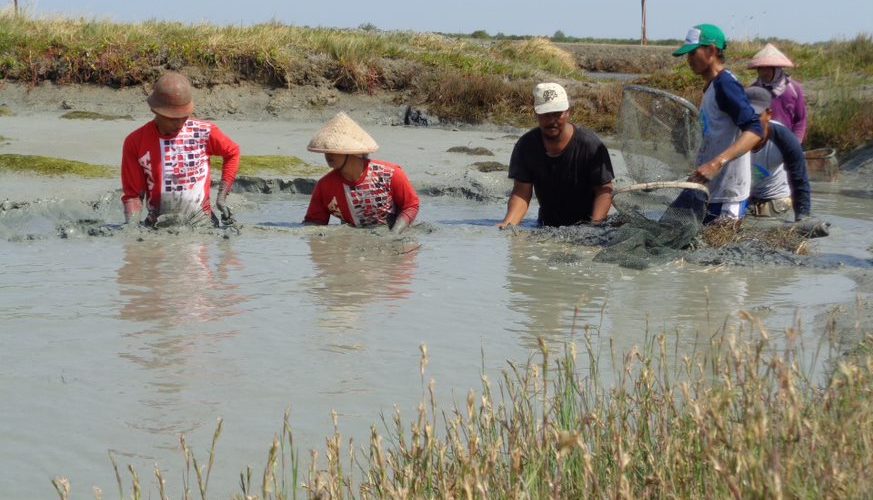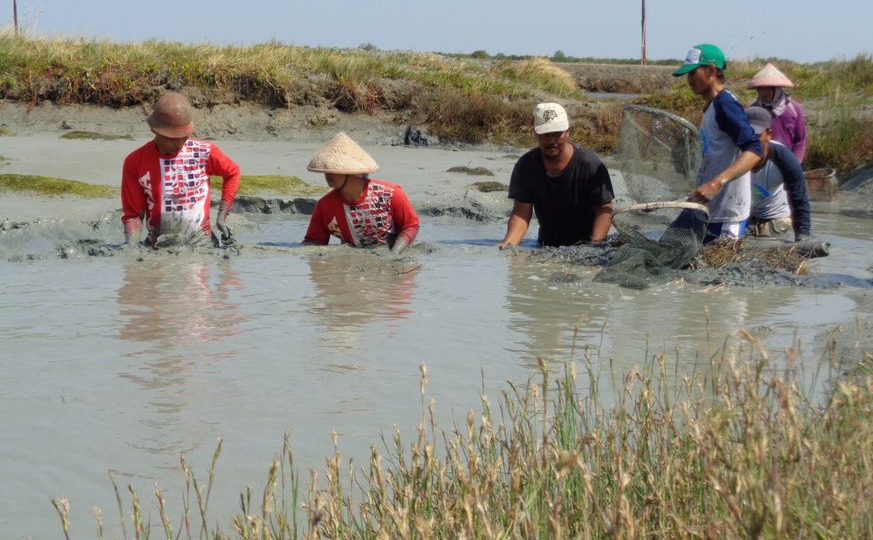Meaningful participation of local stakeholders, especially local communities, is key to successfully Implementing and optimising any Building with Nature solution. In line with this principle and based on analysis of the biophysical as well as the socio-economic systems, the Building with Nature Indonesia initiative integrates revitalisation of aquaculture with mangrove restoration for coastal protection at the landscape scale. This guideline focusses on achieving successful aquaculture revitalisation through the application of Coastal Field Schools.
Lack of training of aquaculture farmers is one of the factors explaining low and unpredictable yields of coastal brackish water ponds, which has contributed to the near disappearance of mangroves. To ensure long term success of more sustainable practices, it is recommended that farmers receive training to develop knowledge and confidence in applying beneficial and ecologically sound aquaculture practices. Coastal Field Schools are extensive year-long learning programmes that enable communities to improve their livelihoods by sustainably managing their coastline and its natural resources. Participants learn to manage their ponds and the surrounding agro-ecosystem, critically evaluate both pond issues and community issues, contribute to mangrove restoration for coastal protection and biodiversity, and discover new opportunities or solutions to emerging local problems.
The creation of sustainable mangrove aquaculture landscapes, and therefore the Coastal Field Schools approach applied in Demak, is of global relevance, given that expanding shrimp aquaculture has been one of the main drivers of the worldwide loss of mangrove forests. The goal of this guideline is to promote sound replication of the BwN approach to revitalizing aquaculture that can mutually benefit from mangrove ecosystems.
SUGGESTED REFERENCE
Bosma, R.H., Rejeki, S., Ariyati, R.W., Widowati, L.L., Fadilha, R., Yuniati, W. (2021). Building Sustainable Aquaculture through Coastal Field Schools. Ecoshape technical report, Dordrecht, The Netherlands.
TECHNICAL GUIDELINE SERIES
This guideline is part 5 of a series of Technical Guidelines on technical and socio-economic Building with Nature measures that, in combination, help to restore eroding tropical muddy coasts. These guidelines are based on insights and lessons learnt during the implementation of a district scale pilot in Central Java as part of the Building with Nature Indonesia programme. By sharing our lessons learnt in these practical guidelines, we aim to enable replication by government agencies, the water and aquaculture sector and NGOs.
Available Guidelines:
#1 Building With Nature Approach
#2 Systems Understanding
#3 Permeable Structures
#4 Associated Mangrove Aquaculture Farms
#5 Sustainable Aquaculture Through Coastal Field Schools
More information about Building with Nature Indonesia: www.indonesia.buildingwithnature.nl

Technical Guidelines #5 'Building Sustainable Aquaculture through Coastal Field Schools'
download
